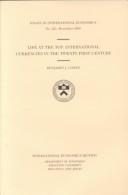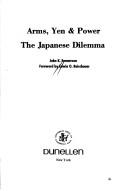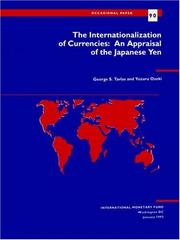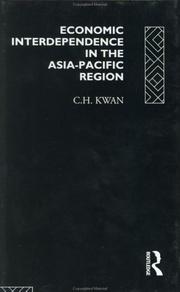| Listing 1 - 10 of 12 | << page >> |
Sort by
|

ISBN: 0881651281 9780881651287 Year: 2000 Volume: 221 Publisher: Princeton (N.J.): Princeton university. Department of economics. International finance section,
Abstract | Keywords | Export | Availability | Bookmark
 Loading...
Loading...Choose an application
- Reference Manager
- EndNote
- RefWorks (Direct export to RefWorks)
Zonder onderwerpscode --- Yen, Japanese --- Dollar, American --- International finance --- AA / International- internationaal --- 333.453 --- 333.450 --- Euro --- 332.45 --- 330.05 --- International monetary system --- International money --- Finance --- International economic relations --- Japanese yen --- Money --- American dollar --- Internationale munt. Rekeneenheden. --- Theorie van het deviezenverkeer. Theorie van de koopkrachtpariteit. --- Theorie van het deviezenverkeer. Theorie van de koopkrachtpariteit --- Internationale munt. Rekeneenheden

ISBN: 0671647636 9780671647636 Year: 1988 Publisher: New York: Simon and Schuster,
Abstract | Keywords | Export | Availability | Bookmark
 Loading...
Loading...Choose an application
- Reference Manager
- EndNote
- RefWorks (Direct export to RefWorks)
Financial institutions --- International finance --- Yen, Japanese. --- Yen, Japanese --- 333.101 --- 382.242.0 --- 382.254 --- JP / Japan - Japon --- Japanese yen --- Money --- International monetary system --- International money --- Finance --- International economic relations --- Banksysteem en bankstelsel --- Balans van het kapitaalverkeer: algemeenheden --- Internationale kredieten --- Financial institutions - Japan. --- Financial institutions - United States.
Book
ISBN: 9780691167855 0691167850 1400873517 9781400873517 0691181063 Year: 2015 Publisher: Princeton, NJ
Abstract | Keywords | Export | Availability | Bookmark
 Loading...
Loading...Choose an application
- Reference Manager
- EndNote
- RefWorks (Direct export to RefWorks)
Monetary rivalry is a fact of life in the world economy. Intense competition between international currencies like the US dollar, Europe's euro, and the Chinese yuan is profoundly political, going to the heart of the global balance of power. But what exactly is the relationship between currency and power, and what does it portend for the geopolitical standing of the United States, Europe, and China? Popular opinion holds that the days of the dollar, long the world's dominant currency, are numbered. By contrast, Currency Power argues that the current monetary rivalry still greatly favors America's greenback. Benjamin Cohen shows why neither the euro nor the yuan will supplant the dollar at the top of the global currency hierarchy.Cohen presents an innovative analysis of currency power and emphasizes the importance of separating out the various roles that international money might have. After systematically exploring the links between currency internationalization and state power, Cohen turns to the state of play among today's top currencies. The greenback, he contends, is the "indispensable currency"-the one that the world can't do without. Only the dollar is backed by all the economic and political resources that make a currency powerful. Meanwhile, the euro is severely handicapped by structural defects in the design of its governance mechanisms, and the yuan suffers from various practical limitations in both finance and politics.Contrary to today's growing opinion, Currency Power demonstrates that the dollar will continue to be the leading global currency for some time to come.
Money --- Dollar, American. --- Euro. --- Renminbi. --- CNY (Money) --- Ren min bi --- RMB (Money) --- Yuan (Money) --- American dollar --- Currency --- Monetary question --- Money, Primitive --- Specie --- Standard of value --- Exchange --- Finance --- Value --- Banks and banking --- Coinage --- Currency question --- Gold --- Silver --- Silver question --- Wealth --- Political aspects. --- International finance --- Dollar, American --- Euro --- Renminbi --- Political aspects --- E-books --- International finance. --- Monetary policy. --- Yen, Japanese. --- Japanese yen --- Monetary management --- Economic policy --- Currency boards --- Money supply --- International monetary system --- International money --- International economic relations
Book
ISBN: 147551350X 1475513291 1475513283 Year: 2013 Publisher: Washington, D.C. : International Monetary Fund,
Abstract | Keywords | Export | Availability | Bookmark
 Loading...
Loading...Choose an application
- Reference Manager
- EndNote
- RefWorks (Direct export to RefWorks)
During risk-off episodes, the yen is a safe haven currency and on average appreciates against the U.S. dollar. We investigate the proximate causes of yen risk-off appreciations. We find that neither capital inflows nor expectations of the future monetary policy stance can explain the yen’s safe haven behavior. In contrast, we find evidence that changes in market participants’ risk perceptions trigger derivatives trading, which in turn lead to changes in the spot exchange rate without capital flows. Specifically, we find that risk-off episodes coincide with forward hedging and reduced net short positions or a buildup of net long positions in yen. These empirical findings suggest that offshore and complex financial transactions should be part of spillover analyses and that the effectiveness of capital flow management measures or monetary policy coordination to address excessive exchange rate volatility might be limited in certain cases.
Yen, Japanese. --- Currency question --- Criminal investigation --- Japanese yen --- Money --- Foreign Exchange --- Money and Monetary Policy --- Statistics --- Finance: General --- Current Account Adjustment --- Short-term Capital Movements --- Financial Markets and the Macroeconomy --- Monetary Systems --- Standards --- Regimes --- Government and the Monetary System --- Payment Systems --- International Financial Markets --- Currency --- Foreign exchange --- Monetary economics --- Econometrics & economic statistics --- Finance --- Exchange rates --- Currencies --- Real exchange rates --- Balance of payments statistics --- Currency markets --- Financial markets --- Balance of payments --- Foreign exchange market --- United States
Book
ISBN: 1498325416 1498317340 1498325394 Year: 2019 Publisher: Washington, D.C. : International Monetary Fund,
Abstract | Keywords | Export | Availability | Bookmark
 Loading...
Loading...Choose an application
- Reference Manager
- EndNote
- RefWorks (Direct export to RefWorks)
The yen is an important barometer for the Japanese economy. Depreciations are typically associated with favorable economic developments such as increased corporate profits, rising equity prices, and upward pressure on domestic consumer prices. On the other hand, large and sharp appreciations run the risk of lowering actual and expected inflation, squeezing corporate profits, generating a negative wealth effect through depressed equity prices, and reducing confidence in the Bank of Japan’s efforts to reflate the domestic economy and achieve the inflation target. This paper takes a closer look at underlying drivers of rapid yen appreciations, highlighting the key role of carry-trade and the zero lower bound as important amplifiers.
Yen, Japanese. --- Japan--Economic conditions. --- Economic history. --- Japanese yen --- Money --- Economic conditions --- History, Economic --- Economics --- Banks and Banking --- Econometrics --- Foreign Exchange --- Investments: Futures --- Money and Monetary Policy --- Bayesian Analysis: General --- Time-Series Models --- Dynamic Quantile Regressions --- Dynamic Treatment Effect Models --- Diffusion Processes --- State Space Models --- Interest Rates: Determination, Term Structure, and Effects --- Monetary Policy --- Monetary Systems --- Standards --- Regimes --- Government and the Monetary System --- Payment Systems --- Pension Funds --- Non-bank Financial Institutions --- Financial Instruments --- Institutional Investors --- Currency --- Foreign exchange --- Finance --- Monetary economics --- Econometrics & economic statistics --- Exchange rates --- Currencies --- Vector autoregression --- Futures --- Zero lower bound --- Econometric analysis --- Financial institutions --- Financial services --- Derivative securities --- Interest rates --- United States

ISBN: 0842400575 9780842400572 Year: 1971 Publisher: New York (N.Y.): Dunellen,
Abstract | Keywords | Export | Availability | Bookmark
 Loading...
Loading...Choose an application
- Reference Manager
- EndNote
- RefWorks (Direct export to RefWorks)
Yen, Japanese --- Japan --- Defenses --- Foreign relations --- Politics and government --- S35/0650 --- -Yen, Japanese --- #SBIB:327.5H21 --- #SBIB:35H6060 --- #SML: Joseph Spae --- Japanese yen --- Money --- Japan--Foreign politics --- -Vrede – oorlog, oorlogssituaties --- Bestuur en beleid: nationale en regionale studies: Azië --- Defenses. --- -S35/0650 --- Vrede – oorlog, oorlogssituaties --- al-Yābān --- Giappone --- Government of Japan --- Iapōnia --- I︠A︡ponii︠a︡ --- Japam --- Japani --- Japão --- Japon --- Japonia --- Japonsko --- Japonya --- Jih-pen --- Mư̄ang Yīpun --- Nihon --- Nihon-koku --- Nihonkoku --- Nippon --- Nippon-koku --- Nipponkoku --- Prathēt Yīpun --- Riben --- State of Japan --- Yābān --- Yapan --- Yīpun --- Zhāpān --- Япония --- اليابان --- يابان --- 日本 --- 日本国 --- Japan - Defenses --- Japan - Foreign relations - 1945-1989 --- Japan - Politics and government - 1945 --- Jepun --- Yapon --- Yapon Ulus --- I︠A︡pon --- Япон --- I︠A︡pon Uls --- Япон Улс

ISBN: 1557751978 Year: 1992 Publisher: Washington, D.C. IMF
Abstract | Keywords | Export | Availability | Bookmark
 Loading...
Loading...Choose an application
- Reference Manager
- EndNote
- RefWorks (Direct export to RefWorks)
International finance --- Monetary policy --- Yen, Japanese --- 330.05 --- 332.4560952 --- 333.111.42 --- 333.432.0 --- 333.432.8 --- 333.453 --- 333.46 --- AA* / International - Internationaal --- JP / Japan - Japon --- 336.74 <520> --- 339.72 <520> --- International monetary system --- International money --- Finance --- International economic relations --- Japanese yen --- Money --- 336.74 <520> Geld. Geldwezen. Monetaire sector.--Japan --- Geld. Geldwezen. Monetaire sector.--Japan --- 339.72 <520> Internationaal betalingsverkeer. Valutahandel. Wisselmarkten. Deviezenhandel. Internationale kapitaalmarkt. Flow and funds analysis. Betalingsbalans. Internationale geldmarkt.--Japan --- Internationaal betalingsverkeer. Valutahandel. Wisselmarkten. Deviezenhandel. Internationale kapitaalmarkt. Flow and funds analysis. Betalingsbalans. Internationale geldmarkt.--Japan --- goudreserves en deviezenreserves --- Monetaire akkoorden en conventies: algemeenheden --- Internationale monetaire organisatie. Internationaal Muntfonds. Algemene leningovereenkomsten --- Internationale munt. Rekeneenheden --- Monetaire toestand en evolutie --- Working papers --- Money. Monetary policy --- Japan
Book
ISBN: 1462338097 1452778221 Year: 1992 Publisher: Washington, D.C. : International Monetary Fund,
Abstract | Keywords | Export | Availability | Bookmark
 Loading...
Loading...Choose an application
- Reference Manager
- EndNote
- RefWorks (Direct export to RefWorks)
A tripolar international monetary system-centered on the U.S. dollar, the deutsche mark, and the yen - appears to be emerging. This paper not only assesses the role of the yen as an international currency but also presents a unified theory of international currency use and distinguishes between the roles of a nation as a world banker and as an international financial intermediary.
Yen, Japanese. --- International finance. --- Monetary policy --- International monetary system --- International money --- Finance --- International economic relations --- Japanese yen --- Money --- Banks and Banking --- Exports and Imports --- Investments: General --- Investments: Bonds --- Money and Monetary Policy --- Industries: Financial Services --- Finance: General --- Monetary Systems --- Standards --- Regimes --- Government and the Monetary System --- Payment Systems --- International Investment --- Long-term Capital Movements --- General Financial Markets: General (includes Measurement and Data) --- Banks --- Depository Institutions --- Micro Finance Institutions --- Mortgages --- Trade: General --- Pension Funds --- Non-bank Financial Institutions --- Financial Instruments --- Institutional Investors --- Monetary economics --- Investment & securities --- International economics --- Banking --- Currency --- Foreign exchange --- Macroeconomics --- Currencies --- Foreign direct investment --- Bonds --- Securities --- Balance of payments --- Financial institutions --- Exports --- International trade --- Capital outflows --- Nonbank financial institutions --- Investments, Foreign --- Banks and banking --- Financial instruments --- Capital movements --- Financial services industry --- Japan
Book
Year: 2019 Publisher: MDPI - Multidisciplinary Digital Publishing Institute
Abstract | Keywords | Export | Availability | Bookmark
 Loading...
Loading...Choose an application
- Reference Manager
- EndNote
- RefWorks (Direct export to RefWorks)
There is no denying the role of empirical research in finance and the remarkable progress of empirical techniques in this research field. This Special Issue focuses on the broad topic of “Empirical Finance” and includes novel empirical research associated with financial data. One example includes the application of novel empirical techniques, such as machine learning, data mining, wavelet transform, copula analysis, and TV-VAR, to financial data. The Special Issue includes contributions on empirical finance, such as algorithmic trading, market efficiency, market microstructure, portfolio theory and asset allocation, asset pricing models, liquidity risk premium, currency crisis, return predictability, and volatility modeling.
short-term forecasting --- wavelet transform --- IPO --- volatility --- US dollar --- institutional investors’ shareholdings --- neural network --- financial market stress --- market microstructure --- text similarity --- TVP-VAR model --- Japanese yen --- convolutional neural networks --- global financial crisis --- deep neural network --- cross-correlation function --- boosting --- causality-in-variance --- flight to quality --- bagging --- earnings quality --- algorithmic trading --- stop loss --- statistical arbitrage --- ensemble learning --- liquidity risk premium --- gold return --- futures market --- take profit --- currency crisis --- spark spread --- city banks --- piecewise regression model --- financial and non-financial variables --- exports --- data mining --- latency --- crude oil futures prices forecasting --- random forests --- wholesale electricity --- SVM --- random forest --- bank credit --- deep learning --- Vietnam --- inertia --- MACD --- initial public offering --- text mining --- bankruptcy prediction --- exchange rate --- asset pricing model --- LSTM --- panel data model --- structural break --- credit risk --- housing and stock markets --- copula --- ARDL --- earnings manipulation --- machine learning --- natural gas --- housing price --- asymmetric dependence --- real estate development loans --- earnings management --- cointegration --- predictive accuracy --- robust regression --- quantile regression --- dependence structure --- housing loans --- price discovery --- utility of international currency --- ATR

ISBN: 041510176X Year: 1994 Publisher: London Routledge
Abstract | Keywords | Export | Availability | Bookmark
 Loading...
Loading...Choose an application
- Reference Manager
- EndNote
- RefWorks (Direct export to RefWorks)
Foreign exchange --- Monetary policy --- Yen, Japanese --- 333.451.1 --- 338.8 --- 382.242.0 --- 382.30 --- 382.50 --- ASI / Asia - Azië - Asie --- Japanese yen --- Money --- Monetary management --- Economic policy --- Currency boards --- Money supply --- Cambistry --- Currency exchange --- Exchange, Foreign --- Foreign currency --- Foreign exchange problem --- Foreign money --- Forex --- FX (Finance) --- International exchange --- International finance --- Currency crises --- Wisselkoersen --- Economische groei --- Balans van het kapitaalverkeer: algemeenheden --- Handels- en wisselpolitiek in hun verband met de buitenlandse handel: algemeenheden --- Internationale handelsbetrekkingen: algemeenheden. --- Japan --- Pacific Area --- Asia-Pacific Region --- Asian-Pacific Region --- Asian and Pacific Council countries --- Pacific Ocean Region --- Pacific Region --- Pacific Rim --- al-Yābān --- Giappone --- Government of Japan --- Iapōnia --- I︠A︡ponii︠a︡ --- Japam --- Japani --- Japão --- Japon --- Japonia --- Japonsko --- Japonya --- Jih-pen --- Mư̄ang Yīpun --- Nihon --- Nihon-koku --- Nihonkoku --- Nippon --- Nippon-koku --- Nipponkoku --- Prathēt Yīpun --- Riben --- State of Japan --- Yābān --- Yapan --- Yīpun --- Zhāpān --- Япония --- اليابان --- يابان --- 日本 --- 日本国 --- Foreign economic relations --- Economic integration. --- Money. Monetary policy --- International economic relations --- Pacific Islands --- Indochine --- Internationale handelsbetrekkingen: algemeenheden --- Jepun --- Yapon --- Yapon Ulus --- I︠A︡pon --- Япон --- I︠A︡pon Uls --- Япон Улс
| Listing 1 - 10 of 12 | << page >> |
Sort by
|

 Search
Search Feedback
Feedback About UniCat
About UniCat  Help
Help News
News